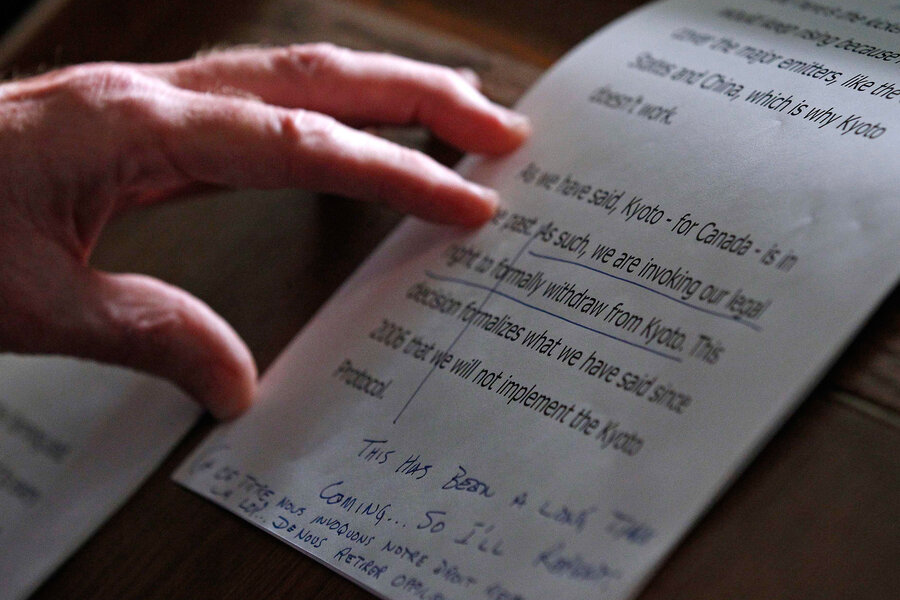Fears over Paris climate deal: Could the US back out?
Loading...
The top US negotiator to the 2015 United Nations Paris Climate Summit insists the United States will sign the international Paris climate deal, despite a recent Supreme Court stay.
"It is entirely premature, really premature to assume the Clean Power Plan will be struck down but, even if it were, come what may, we are sticking to our plan to sign, to join," US climate envoy Todd Stern told Reuters.
The Supreme Court has not actually struck down President Obama's Clean Power Plan, a series of emissions caps issued last summer by the Environmental Protection Agency and challenged by 29 states. The Supreme Court cannot even place the case on its docket until an appeals ruling is made, but the court's intervention last week suggests unusual disapproval from the nation's highest court, Henry Gass wrote for The Christian Science Monitor.
Mr. Stern said refusing to sign the deal officially in April or drawing back from it afterward would have dramatic diplomatic consequences no US leader would welcome.
"Paris was seen as such a landmark, hard-fought, hard-won deal that, for the US to turn round and say we will withdraw, that would inevitably give the country a kind of diplomatic black eye that I think a president of any party would be very loath to do," he told Reuters.
But the American track record on international agreements may not inspire confidence in some circles.
As recently as the 2000s, former President George W. Bush, in a series of steps and talks, pulled the US away from the 1997 Kyoto Protocol, an early international effort to curb carbon emissions. Stern told Reuters the Kyoto Protocol is now viewed as a flawed agreement, and former President Bill Clinton never submitted it to Congress. Even before Mr. Bush took office, the Senate had indicated its disapproval by unanimous vote for fear it would harm the US economy.
The US is diplomatically active, but sometimes avoids signing onto treaties, even if the aims are generally approved of, for fear of sacrificing national autonomy. One famous example is the United States' refusal to join the League of Nations after World War I. Then-President Woodrow Wilson had crafted the idea and pushed the nations of Europe to adopt it as part of his "Fourteen Points" plan, but the Senate employed a filibuster to avoid signing the treaty, and the organization limped along, ultimately failing to prevent World War II.
And US non-participation has not been limited to climate issues. Former President Jimmy Carter signed the Convention on the Elimination of All Forms of Discrimination Against Women, adopted by the United Nations in 1979, Congress never ratified the treaty. Several presidents since then have expressed interest in it, but it remains "alone among its major allies," in not ratifying it, the Monitor wrote in 1994. Congress has said ratifying a treaty so few nations respect would be meaningless.
As one of many plans to stymie North Korea's nuclear ambitions, the US, along with South Korea and Japan, promised in 1994 to build two light water reactors for North Korea if it would shut down a nuclear plant.
"This was hailed as a landmark deal that would put an end to North Korea’s nuclear threat," Peter Ford wrote for the Monitor. "But amid mutual suspicions, the allies put that project on the back-burner until the first concrete was poured eight years later, and abandoned it in 2003."
Abandoning an individual treaty has rarely meant abandoning the attempt to solve a problem, however. The US has continued engaging in discussion and initiatives on women's rights, North Korea's nuclear plans, and climate change.
The climate deals could prove another example of the US acting more independently than planned. The Clean Power Plan has been described as the "linchpin" of US promises on the climate deal, but individual states and cities are effectively changing their energy plans in ways that could eventually meet the terms of the deal in the long-term, even as the federal mandates work slowly through the courts.








